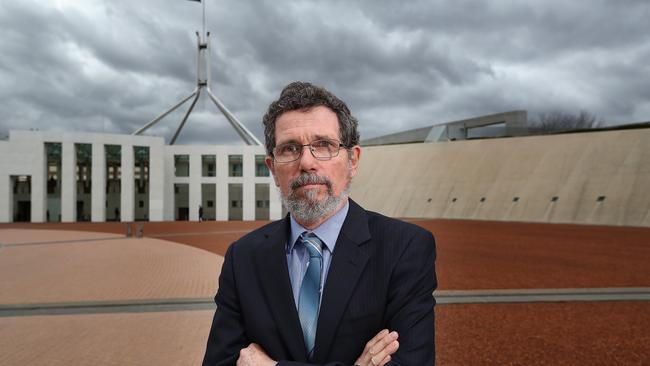Peter Ridd’s views ‘protected’ by James Cook University job clause
Peter Ridd’s right to express unorthodox and unpopular ideas was protected by an ‘intellectual freedom’ clause in his uni’s enterprise agreement, his lawyers say.

Academic Peter Ridd’s right to express unorthodox and unpopular ideas — including criticising his colleagues’ research on the Great Barrier Reef — was protected by an “intellectual freedom” clause in his university’s enterprise agreement, his lawyers have told the Federal Court.
The marine physicist was sacked by James Cook University in 2018 after he publicly criticised its climate change science relating to the Great Barrier Reef.
He claimed his colleagues’ research on coral bleaching and the effects of global warming on the reef was untrustworthy and misleading.
The north Queensland university is now challenging a decision by the Federal Circuit Court to award Dr Ridd about $1.2m in compensation and penalties, after it found he was unlawfully dismissed.
Both JCU and Dr Ridd have assembled a star-studded legal team to fight their case.
Dr Ridd’s barrister Stuart Wood QC told the full Federal Court on Tuesday that JCU’s enterprise agreement protected employees’ “intellectual freedom”.
The freedom gave staff the right to express unpopular or controversial views and to disagree with university decisions. This was subject only to the limitation that they could not vilify, harass, bully or intimidate other people, which JCU accepted Dr Ridd had not done, he said.
Intellectual freedom was an “ancient concept” and “mission critical” to the university; its purpose was to promote truth, through the contest of ideas, he said.
“Even vile ideas, unorthodox ideas, ideas that are antithetical to both common sense and at times, common decency, are allowed to be expressed so that in the collision of ideas … truth will win out,” he said.
Mr Wood said provided staff stayed within the “four walls” of the intellectual freedom clause, they could not be punished for breaching JCU’s code of conduct.
However, JCU’s barrister Bret Walker SC told the bench of three Federal Court judges - John Griffiths, Darryl Rangiah and Sarah Derrington - that the enterprise agreement incorporated the university’s code of conduct, which included a requirement that staff act in a respectful and collegiate manner towards their colleagues.
Mr Walker said it would be a “particularly grim and barbarous view” of the responsibility to respect the rights of others if it could be exhausted merely by refraining from harassing, vilifying, bullying or intimidating others if they disagreed with you.
The National Tertiary Education Union has backed Dr Ridd’s position, arguing in written submissions to the Federal Court that the idea that the exercise of intellectual freedom should be subject to the university’s code of conduct was to be rejected.
It argued that academic freedom was “the defining characteristic of universities”, and that the EBA must be understood in this historical context.
Dr Ridd was sacked after 27 years at JCU after being censured three times for publicly criticising his colleagues and the university.
JCU has always insisted Dr Ridd was not sacked because of his scientific views but for denigrating the university and its employees and breaching confidentiality.
The university is appealing both the decision that he was unfairly dismissed and the amount of his award.
The case continues.


